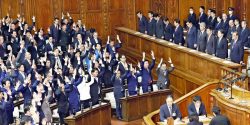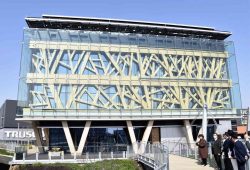12:30 JST, June 21, 2022
There are still many people continuing to have aftereffects from infection with the novel coronavirus. It is important to make it possible for a wide range of medical institutions, including clinics serving local communities, to provide medical care, while at the same time to increase the number of outpatient medical care sections specializing in COVID-19 treatment.
COVID-19 aftereffects can last for a year or longer and include cough, fatigue and dysfunction of the sense of taste. Although the currently prevalent omicron variant is believed to be less likely to cause aftereffects compared to the earlier delta variant, the number of patients with aftereffects is inevitably increasing due to the large number of people infected.
Another characteristic is that many people have aftereffects even if their symptoms were mild at the time of infection. These aftereffects are also being widely seen among the younger generation, with people having trouble dealing with work or school becoming noticeable. It is necessary to create an environment that encourages early recovery by establishing a treatment system.
The central government and some local ones have been working to set up consultation services and specialized outpatient services for people who have COVID-19 aftereffects. However, none of these efforts have progressed as expected.
The Health, Labor and Welfare Ministry has released special guidelines for medical treatment to enable local medical institutions to deal with COVID-19 aftereffects. The guidelines outline specific remedies, aiming to increase the number of doctors who can treat patients with such aftereffects.
There is also the case of the Saitama Medical Association, which shares among medical institutions its own compilation of information on aftereffects. Medical institutions with specialized outpatient sections for COVID-19 and medical institutions serving local communities should cooperate to prevent a situation where patients with aftereffects are unable to find a place for treatment.
Treatment methods for COVID-19 aftereffects have not been established among specialized outpatient services, so the basic principle is to treat the symptoms. Cough and fatigue are among the symptoms treated along the same lines as in routine medical care. For respiratory, neurological and other specialized symptoms, patients can be referred to hospitals specializing in such care.
Many doctors in private practice and privately run small and midsize hospitals were criticized for not treating COVID-19 patients. In light of such circumstances, it is hoped that such medical institutions will be actively involved in the treatment of the aftereffects of the disease.
The cause of the aftereffects has not been determined, although it is being studied in various countries.
In addition to one theory that the virus remains in the body after recovery and attacks cells and tissues, it has recently been suggested that abnormalities in the immune system may interfere with brain function, resulting in memory impairment and poor concentration.
The government and the medical community need to analyze the information accumulated in clinical practice and promote efforts to find cures for aftereffects.
Since it is difficult to determine whether certain symptoms are due to COVID-19 aftereffects, there is a phenomenon of these patients not being understood by those around them at home or at work, such as by being told, “It’s just your imagination.”
To prevent patients from being isolated, the government should make efforts to disseminate information on the actual state of patients with aftereffects to deepen society’s understanding.
(From The Yomiuri Shimbun, June 21, 2022)
Top Articles in Editorial & Columns
-

40 Million Foreign Visitors to Japan: Urgent Measures Should Be Implemented to Tackle Overtourism
-

University of Tokyo Professor Arrested: Serious Lack of Ethical Sense, Failure of Institutional Governance
-

China Provoked Takaichi into Risky Move of Dissolving House of Representatives, But It’s a Gamble She Just Might Win
-

Policy Measures on Foreign Nationals: How Should Stricter Regulations and Coexistence Be Balanced?
-

PM Takaichi Should Help Young Japanese Break Seniority Barrier to Vitalize Politics
JN ACCESS RANKING
-

Japan Institute to Use Domestic Commercial Optical Lattice Clock to Set Japan Standard Time
-

Israeli Ambassador to Japan Speaks about Japan’s Role in the Reconstruction of Gaza
-

Man Infected with Measles May Have Come in Contact with Many People in Tokyo, Went to Store, Restaurant Around When Symptoms Emerged
-

Prudential Life Insurance Plans to Fully Compensate for Damages Caused by Fraudulent Actions Without Waiting for Third-Party Committee Review
-

Woman with Measles Visited Hospital in Tokyo Multiple Times Before Being Diagnosed with Disease





















